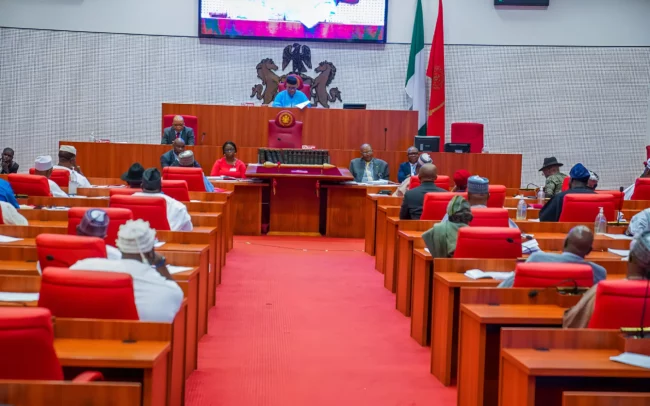
SENATE PASSES BILL PRESCRIBING 14-YEAR JAIL TERM FOR EDUCATORS CONVICTED OF SEXUAL HARASSMENT
By Aishat Momoh. O.

The Senate on Wednesday passed a bill proposing up to 14 years’ imprisonment for educators found guilty of sexually harassing students in tertiary institutions across Nigeria.
The legislation, titled Sexual Harassment of Students (Prevention and Prohibition) Bill, 2025 (HB.1597), was presented for concurrence by the Senate Leader, Senator Opeyemi Bamidele (APC, Ekiti Central).
Bamidele explained that the bill seeks to protect students from sexual misconduct and abuse in academic environments while establishing clear legal frameworks for enforcement and punishment.
According to him, the bill aims to uphold ethical standards in higher education and safeguard “the sanctity of the student-educator fiduciary relationship of authority, dependency, and respect for human dignity.”
Under the new law, offenders found guilty of offences under Clause 4 (1), (2), and (3) will face between 5 and 14 years in prison without an option of fine, while those convicted under Clause 4 (4), (5), and (6) face between 2 and 5 years imprisonment, also without an option of fine.
The bill also empowers victims to pursue civil action for breach of fiduciary duty, with the standard of proof aligning with that of civil proceedings.
It defines sexual harassment broadly to include demanding sexual favours, making unwelcome advances, inducing others to harass students, and unwanted physical contact or gestures.
Importantly, the legislation stipulates that consent cannot be used as a defence in educator-student relationships, except in cases of legally recognised marriage.
It further provides that complaints can be filed by the student, relatives, guardians, or concerned parties to the Police or Attorney-General, with copies submitted to the institution’s Independent Sexual Harassment Prohibition Committee.
During deliberation, some lawmakers pushed for broader coverage. Senator Adams Oshiomhole (Delta North) argued that the bill should extend beyond educational settings to include workplaces and other sectors.
“There is no need to restrict sexual harassment issues to students. We should craft this law in a way that gives it universal application,” Oshiomhole said.
However, Deputy Senate President Barau Jibrin, who presided over the session, clarified that the bill had already passed in the House of Representatives and was only before the Senate for concurrence. He added that existing laws already address workplace harassment.
The bill was subsequently adopted and passed for third reading.
The passage of the legislation comes amid recurring reports of sex-for-grades scandals across Nigerian universities, including a 2019 undercover investigation that exposed systemic sexual exploitation in multiple institutions.
Rights advocates and women’s groups have hailed the development as a major step toward accountability, stressing that a strong federal framework was long overdue to combat sexual abuse and protect students from intimidation and silence.
